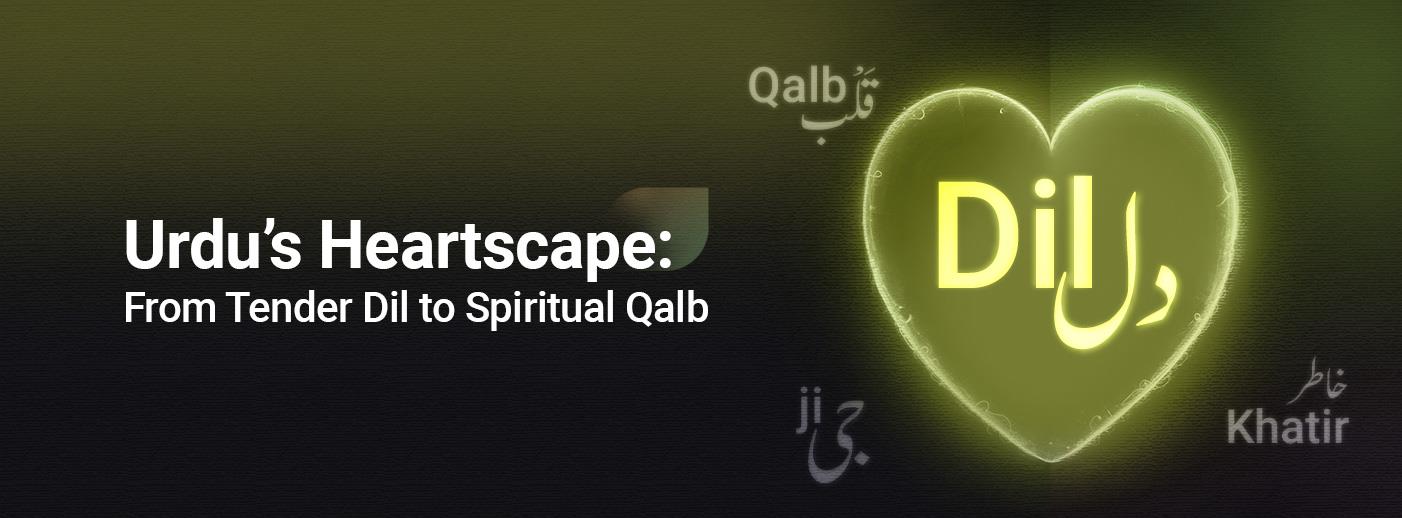Top searched
Saved words
khisyaanii billii khambaa noche
an embarrassed or ashamed person tends to vent his/her feeling by quarrelling
be-niyaaz
without want, free from want, wanting nothing, not in need, able to dispense, independent, carefree
Urdu’s Heartscape: From Tender Dil to Spiritual Qalb

The heart is not only an organ of the human body, it is also the seat of emotions, feelings, courage, and love. Naturally, in a language as rich as Urdu, one word cannot capture all these shades. Instead, we find several words, each with its own origin and character, all circling around this tender human reality.
Dil دل and Jī جی
The most familiar word is dil, of Persian origin. In everyday Urdu, however, its Sanskrit counterpart manمن is also used, and another Sanskrit-derived synonym, jī, also appears. But no two words are ever perfect synonyms — each carries its own weight, history, and tone.
To see how dil and jī behave in language, let us turn to Fani’s couplet, which brings them together beautifully:
شوق سے ناکامی کی بدولت کوچۂ دل ہی چھوٹ گیا
ساری امیدیں ٹوٹ گئیں دل بیٹھ گیا جی چھوٹ گیا
— فانی
shauq se nākāmī kī badaulat kūcha-e-dil hī chhūT gayā
saarī umīdeñ TuuT ga.iiñ dil baiTh gayā jī chhūT gayā
— Fani
(Because of failure born of passion, even the street of the heart was left behind.
All hopes were shattered — the heart collapsed, the spirit gave way.)
In this verse, dil baiṭhnā (the heart collapsing) is an idiom, meaning to lose zest or hope. Jī chhūTnā means to lose courage.
But idioms are tricky: you cannot always swap dil with jī. For example:
• دل ہارنا (dil hārnā) → to fall in love.
• جی ہارنا (jī hārnā) → to lose courage.
And so, each word carves its own domain. Interestingly, jī in Urdu stretches beyond the heart: added to names, it becomes a marker of respect — as in “Ahmad-jī.”
Qalbقلب
From Arabic we have qalb, another word for the heart. You may have heard the phrase sukūn-e-qalb (peace of heart). In medical terms too, qalb is used, as in ‘āriza-e-qalb (heart disease).
But here’s the rule: when referring to the physical organ, dil can be used, qalb can be used, but jī cannot! You cannot say “jī’s disease.”
In Sufi thought, however, qalb rises beyond anatomy. It is not the piece of flesh in the chest but a subtle spiritual center — the heart as the seat of divine light.
Khāṭir خاطر
Another Arabic-origin word, khāṭir, also stands near the heart. Often it means mind or feeling, and you surely know it in the sense of hospitality — khāṭir-dārī. But in poetry, it carries the delicate shades of the inner self.
Ghalib uses it masterfully:
آج ہم اپنی پریشانیٔ خاطر ان سے
کہنے جاتے تو ہیں پر دیکھیے کیا کہتے ہیں
غالبؔ
aaj ham apnī pareshāni-e-khāṭir un se
kahne jaate to haiñ par dekhiye kyā kahte haiñ
— Ghalib
“Today I go to tell her what troubles my heart,
but let’s see what I am able to say when I reach he
Here, pareshāni-e-khāṭir means the restlessness of the heart. Similarly, ghubār-e-khāṭir (dust of the heart) is the title of Maulana Azad’s famous collection of letters.
The Many Faces of Dil
Of all these words, dil has the widest playground. It fuses with other words, creating countless shades of character and emotion. Consider:
• buz-dil (cowardly)
• pāk-dil (pure-hearted)
• tang-dil (a miser, close-fisted)
• khush-dil (cheerful)
• daryā-dil (generous)
• raḥm-dil (compassionate)
• zinda-dil (lively)
• sang-dil (stone-hearted)
• sher-dil (brave)
• narm-dil (tender-hearted)
• nek-dil (kind-hearted)
• murdah-dil (spiritless)
In such compounds, neither qalb nor jī can replace dil.
And then there are the beloved poetic compounds:
dil-bar (beloved)
dil-dār (affectionate one)
dil-girifta (sad, melancholic heart)
dil-nashīn (pleasing)
dil-kash (charming).
Conclusion
So, is there one word for heart in Urdu? Certainly not. There is dil with its emotional range, jī with its gentle respect and courage, qalb with its spiritual gravity, and khāṭir with its subtle inwardness.
Each word is like a window to a different chamber of the same heart — bodily, emotional, spiritual, or social. And that is the beauty of Urdu: it does not confine the heart to one meaning but lets it bloom in many colors
Delete 44 saved words?
Do you really want to delete these records? This process cannot be undone






